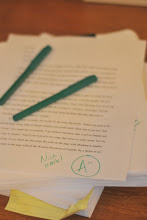I was writing a paper to use as a model for my students in a fairly traditional 11th Grade class. They are working on an assignment in which they have to analyze a passage from a play by Shakespeare. So I chose a passage from a different play (one of my favorites- yes I am a literature geek). I wrote a paper (about 750 words- these are very short papers), and handed it off to my teammate to give it a read. We were sitting in my office and my office-mate (M. Shelly) joined in the conversation (I wasn't trying to cut her out, we just don't teach the same classes). Soon we were all involved in a conversation about not only my paper, but what we thought a paper like this should look like. What qualities made a paper like this good? We were, in essence, fully engaged in a writing conference, with my writing as the center of attention.
It was a really interesting experience from several different perspectives. First, writing this paper was tough. And I am a professional in this field, I know the play I was writing about, I know the passage cold (mostly have it memorized), and most days I am a pretty good writer. Even so, this is a tough assignment. It isn't tough to think about the passage, but to convert that thinking into a cogent, articulate and extremely focused piece of writing was really challenging. It was a good reminder that what we ask our students to do every day is hard. Even for our good students (and most of my students are very good at being students).
Second, it was interesting to have my writing worked over in the same way that I do my student's writing. I am serious about both writing and thinking about literature. I am a veteran of writing workshops, have my own committed writing practice, and have the toughest editor I know close to hand (I am married to her). It is tough to take criticism, even from people I know like and trust, in a neutral setting! And I really trust both the source of the criticism and the nature of the comments. I have no doubt that following my colleague's advice will improve my paper, and I still wanted to fight about it.
My students are worried about being 'right,' worried about what I will think of them, worried about what their peers will think of them, and all too often they don't really understand why I care about their writing, because they don't. They just want a grade and to move on. Or they want to know how to get to the 'right' answer- and that is tough when studying literature. For many, English class is a perennial mystery, where they never really get a grip on what it is we are doing, no matter how hard my colleagues and I try to make it transparent (yes, I know that there are just as many who love this class, but I am not as worried about them for immediate purposes). What must it be like to have a conference with me?
And third, in the middle of a really engaged conversation about my paper and papers like this in general- a thought struck me. I said to my colleagues, "Wee need to stop doing this in here (here being in our office) and do it in our classrooms." We need to model what it really takes to get good at writing, which was all the things we had in play in my office. I was genuinely committed to the writing (my geekiness knows no bounds), my colleagues we genuinely committed to helping me, and we had the freedom to have a real conversations because we had an already established relationship of trust and respect, making the office a safe place to float my writing.
So I guess the tough question is really, how do I get students to that place. That, of course, is a pretty complicated question. It would be great if the intertube out there had some answers. I am not sure it does. We did talk about how to arrange our schedules so that we could model these kinds of discussions for our students. That is a start.
I am actually not going to show my students a revised draft of the paper, at least not right away. I want them to see it in its raw first draft, without the benefit of the revision process. I took some notes, and Shelly wrote some things on the back of my draft, and I think I will take some suggestions from my students as well.
It was, far and away, the best part of my day.
F. Scott


No comments:
Post a Comment